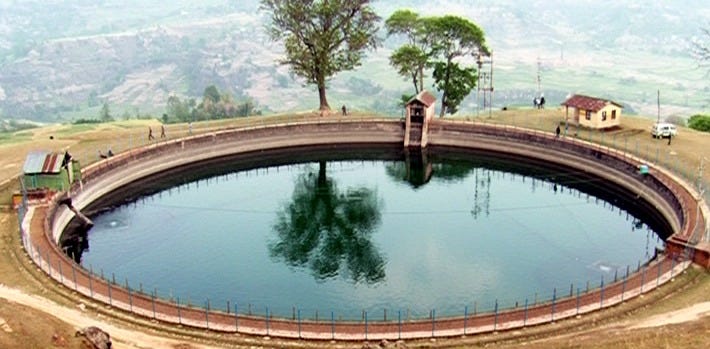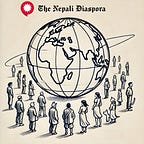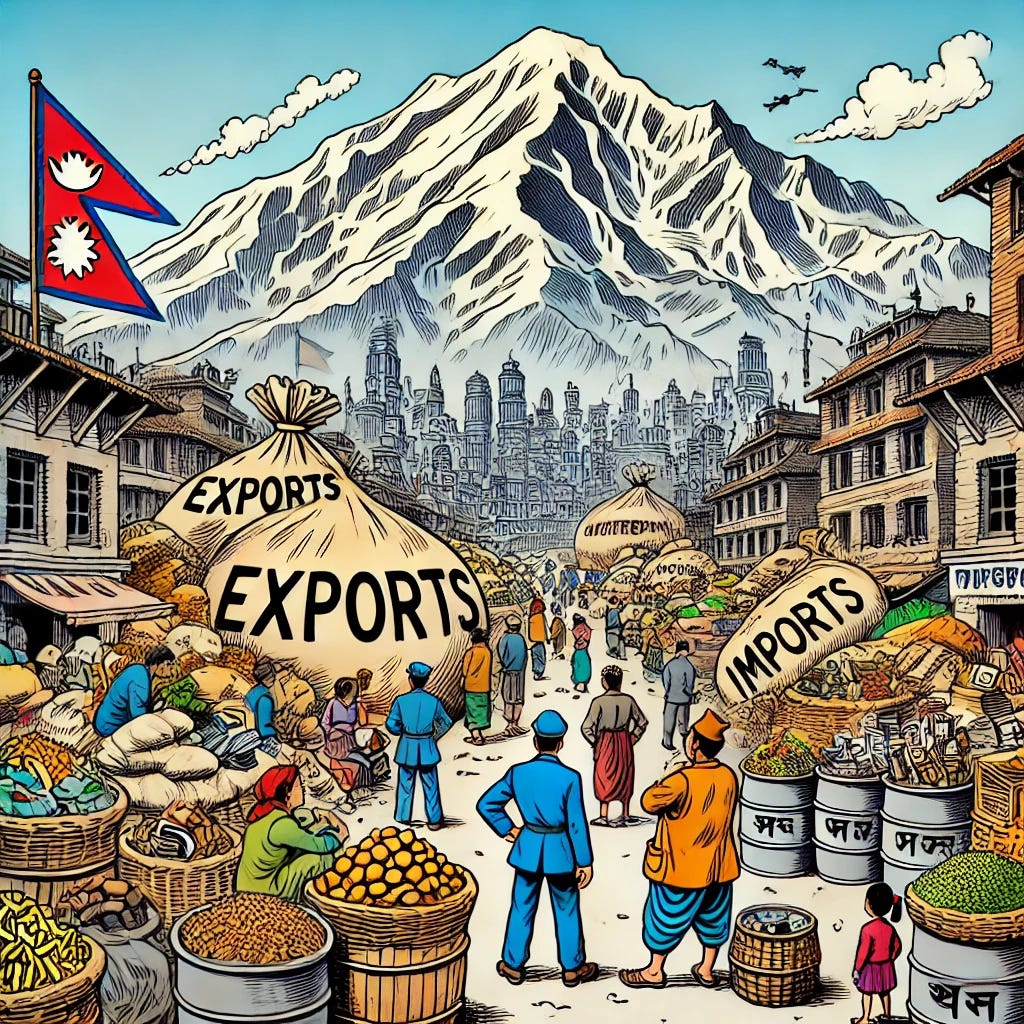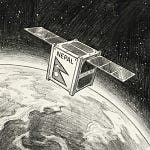Nepal’s news this week is a wild ride 🚀—from eye-popping trade deficits and a campus crisis that’s rocked the nation 😢, to a vibrant revival in traditional Dhaka fabric and even solar-powered solutions for snow leopards 🐆. While the government scrambles to dodge FATF penalties ⚠️ and political alliances fizzle out, innovative exports and digital transformations prove that Nepal never runs out of surprises. Buckle up and join us as we dive into a rollercoaster of economic, cultural, and political twists that keep the nation buzzing! 🎢✨
Economy & Development 💸
📊 Nepal’s trade deficit soars to Rs 861.38 billion, despite a 46% export increase.
Imports: Rs 988.58 billion
Exports: Rs 127.20 billion
Import-to-export ratio: 🚢 88.6% imports vs. 11.4% exports—a major imbalance
Biggest Deficits:
🇮🇳 India: Rs 498.34 billion deficit
🇨🇳 China: Rs 190.44 billion deficit
Other countries: UAE, Argentina, Australia
India remains Nepal’s largest trade partner and contributor to the deficit, with imports from India at Rs 596.35 billion compared to just Rs 98.75 billion in exports. Nepal also faces a massive Rs 190.44 billion deficit with China, as exports to the northern neighbor remain minimal. Despite Nepal maintaining a trade surplus with 35 countries, including Afghanistan, the gains are minor compared to the massive deficits with India and China. Experts stress that diversifying exports beyond soybean oil and agricultural goods and reducing reliance on expensive imports like petroleum is crucial for long-term economic stability. (Source: THT)
Despite these trade challenges, one unlikely Nepali export is thriving—dog chews. Nepal’s dog chew exports surged by 27.82%, with over 90% of production headed for the U.S. and Canada. While demand grows, producers are securing more raw materials to scale up. (Source: KTM Post)
In other developments, Nepal is seeing a shift toward digital transformation. The E-Commerce Bill was unanimously passed, aiming to regulate and systematize online transactions amid a growing digital economy. The law introduces consumer protections, taxation measures, and guidelines for online retailers, marking a significant step toward formalizing Nepal’s e-commerce sector. Additionally, EV imports surged to Rs 15 billion, signaling a shift toward sustainable transport, while Nepal’s handmade paper industry struggles to survive digitization. These trends reflect both growing modernization and economic shifts as Nepal adapts to new market dynamics. (Sources: OnlineKhabar, KTM Post)
Social & Cultural ⭐
The tragic death of Prakriti Lamsal, a third-year B.Tech student at KIIT University in India, has ignited protests, diplomatic intervention, and widespread public outrage. Lamsal endured months of blackmail and harassment from a fellow student, but her complaints were ignored by university authorities. Suspected to be a suicide, her death has raised serious allegations of institutional negligence, with students accusing KIIT of tampering with evidence and suppressing the case.
In response, 500+ Nepali students protested but were forcibly evicted, beaten, and abandoned at a railway station. Social media erupted in anger after videos surfaced of KIIT staff assaulting students and making xenophobic remarks. Nepal’s government intervened, leading to the arrest of the accused student and a promise of a fair investigation from Indian authorities. KIIT, in an attempt at damage control, has announced scholarships in Lamsal’s name but has yet to issue an apology. While the university has invited students back, concerns over justice and student safety remain unresolved (Sources: Republica, KTM Post, OnlineKhabar)

Despite this somber backdrop, Nepali fashion is experiencing a cultural revival, with Dhaka fabric making a strong comeback in modern wardrobes. Once reserved for formal attire and traditional topis, Dhaka is now appearing in corporate wear, wedding outfits, and even accessories. Designers and entrepreneurs are blending handwoven craftsmanship with contemporary styles, making Dhaka more accessible and versatile for younger generations. This revival not only strengthens Nepali cultural identity but also provides sustainable economic opportunities for local weavers, preserving a centuries-old tradition in an era of mass production. (Source: KTM Post)
In Nepal’s highlands, local women are leading efforts to protect endangered snow leopards while securing their livelihoods. In Dolpa, farmers who once retaliated against the big cats are now using solar-powered deterrents and reinforced enclosures to prevent livestock attacks. Conservationist Tshiring Lhamu Lama has already distributed 100 deterrent devices, with plans to expand, fostering a model of coexistence between humans and wildlife. (Source: BBC Future)
Finally, Nepal’s tourism industry is shifting towards luxury and experiential travel, catering to a growing demand for high-end, culturally immersive experiences. Hospitality entrepreneur Desh Bandhu Basnet highlights the rise of eco-tourism, wellness retreats, and premium accommodations, particularly among Indian and Chinese tourists. While Nepal has long been known for adventure tourism, industry leaders see opportunities in attracting upscale travelers looking for a blend of heritage, comfort, and sustainability. (Source: KTM Post)
Enjoyed this digest? Share the love 💙—forward it to friends and family who want to stay in the loop on Nepal. Your support means the world! 🙌✨
Politics & Governance 🪧
Bad news for Nepal’s financial standing—The country is back on the FATF grey list, meaning tougher international scrutiny on banking and financial laws. If not fixed, Nepal could face sanctions that impact businesses, remittances, and foreign investment.
Nepal has been placed back on the Financial Action Task Force (FATF) grey list, amid mounting concerns over deficiencies in its anti-money laundering (AML) and counter-terrorist financing (CFT) frameworks. This designation reveals critical vulnerabilities in regulatory enforcement and oversight, particularly in high-risk sectors like real estate, cooperatives, and informal money transfer services. The FATF’s renewed scrutiny underscores that Nepal’s current financial safeguards are insufficient, potentially leading to increased transaction costs, reduced foreign investment, and the risk of international sanctions if remedial measures are not swiftly implemented.
Finance Minister Bishnu Prasad Paudel has pledged a series of reforms—including enhanced risk-based supervision and improved coordination among law enforcement agencies—to address these gaps within a strict two-year deadline, after which Nepal could face a transition to the FATF blacklist with severe consequences for its access to global financial markets. (Source: KTM Post)
In other political developments, Madhav Kumar Nepal—the leader of the CPN (Unified Socialist) party—has firmly dismissed any possibility of a merger with other leftist factions, including the CPN (Maoist Centre). This statement comes shortly after suggestions of unification were floated by some within the Maoist Centre, underscoring persistent divisions within Nepal’s leftist political landscape and signaling continued challenges in forming cohesive alliances ahead of upcoming elections. (Source: KTM Post)
Did you know ❓

Nepal’s first hydroelectric power station, the Pharping Hydro Power Project, was established in 1911. Originally named the Chandrajyoti Hydro-electric Power Station, it was inaugurated by King Prithvi Bir Bikram Shah Dev during a historic lighting ceremony at Tudhikhel, Kathmandu.
As the second hydroelectric plant in South Asia, this pioneering project marked Nepal’s early foray into renewable energy. Though it no longer generates electricity, the site was transformed into a Living Museum in 2010, preserving its legacy as a testament to Nepal’s engineering history. Today, its reservoir contributes to the drinking water supply for Lalitpur District. This little-known piece of Nepal’s energy history remains a symbol of the country’s long-standing commitment to sustainability.
Diaspora & Globalization 🌎
Nepal Airlines and Japan Airlines have inked an interline deal that makes booking a single ticket to global destinations a reality, boosting both tourism and trade. This move promises smoother connections for travelers worldwide while putting Nepal on the international travel map. (Source: REP)
US President Donald Trump has slammed Nepal's federalism aid as a fraud, leading to the cancellation of key grants and sparking heated debate both online and in diplomatic circles. (Source: THT)
In a bold, tongue-in-cheek response, Kathmandu Mayor Balen Shah thanked Trump for making Nepalis appreciate their own country's strengths—a remark that has struck a chord with the global Nepali community. (Source: Nepal News)
Let’s connect
Loved this issue? Share it with friends and help us keep Nepalis worldwide informed!📩 Share your thoughts! Let us know what you think via our Feedback form or follow us on Facebook | LinkedIn
About Nepali Diaspora Digest:
The Nepali Diaspora Digest connects the global Nepali community with curated news, insights, and stories that matter most. Join us as we celebrate and explore the diverse voices and achievements of Nepalis worldwide.
Partner shout out
belayat.uk: helping Nepalis connect in the UK on jobs, housing, events and finding local nepali owned businesses















